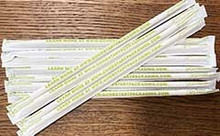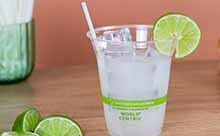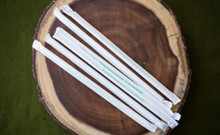Compostable Straws
Plastic straws are nearly impossible to recycle as their shape makes it difficult to fit through recycle sorter machines where they clog equipment. Fortunately, there are now eco-friendly alternatives!
Free Samples, Wholesale Pricing & FREE Shipping +$50!
Our collection of sustainable straws are made from PHA a bioplastic derived from renewable plant sources. A home and industrial compostable and marine degradable straw solution your customers will appreciate. Made in the USA! Below are diameters for each of our straws.
- Standard Straws - 0.24" wide (Available in Standard or Long Lengths)
- Smoothie Straws - 0.276" wide (Available in Standard or Long Lengths)
- Cocktail Straws - 0.137" wide
- Boba Straws - 0.433" wide
Compostable Straws FAQs
What’s the difference between compostable, biodegradable, and marine‑degradable straws?
Biodegradable straws break down over time via microbes, but may not fully decompose or eliminate microplastic residues.
Compostable straws are engineered to decompose fully under specific composting conditions (e.g., industrial or home), leaving no harmful residues.
Marine‑degradable straws are designed to degrade in ocean conditions, helping reduce plastic pollution if they end up in marine environments.
Can compostable straws be composted at home or do they require industrial facilities?
Most compostable straws, especially those made from PLA, require industrial composting conditions (higher temperatures and controlled moisture) to break down effectively. Home compost piles often lack these conditions, meaning such straws may not fully degrade and could remain intact for years.
What compostable certifications should consumers look for?
Seek credible certifications to ensure proper compostability:
- BPI (Biodegradable Products Institute) — aligned with ASTM D6400/D6868 for industrial composting
- EN 13432 and TÜV Austria OK Compost INDUSTRIAL/HOME — European standards for industrial or home composting suitability
How long does it take for compostable straws to decompose?
In industrial composting: typically 90–180 days, depending on material type (PHA degrades in ~90 days; paper or cellulose may take longer).
In home composting: decomposition can stretch to several months or even years, especially for materials not certified for home composting.
Why do compostable straws still pose challenges for proper disposal?
Even with a compostable label, most straws may not be treated correctly. Many are labeled "compostable" without specifying whether they are suitable for home composting, leaving consumers confused. Moreover, the limited availability of industrial composting facilities in many areas means even certified products can end up in landfills where they don’t decompose properly.
Compostable Tableware FAQs
What materials are used in Good Start Packaging’s compostable tableware?
Good Start Packaging’s eco‑friendly tableware is crafted from sustainable, biodegradable materials such as bagasse (sugarcane fiber), PLA (cornstarch-based bioplastic), and bamboo fiber—all renewable alternatives to traditional plastics.
Is this sustainable tableware safe for hot and cold foods?
Absolutely. Compostable materials like bagasse and bamboo are heat-resistant and leak‑proof, making them suitable for both hot and cold dishes. Many of these products are also microwave-safe.
How long does compostable tableware take to decompose?
Decomposition time varies based on the material and composting environment. Sugarcane (bagasse) typically breaks down within 90 days in commercial composting facilities, while bamboo or paper tableware may take longer. Home composting may extend these timelines.
How should I properly dispose of compostable tableware?
For effective composting, check product labels for compostability certifications (e.g., BPI, ASTM, OK Compost). Use industrial composting facilities when available; otherwise, verify that materials are home‑compostable.
Can I buy sustainable tableware in bulk or with custom branding?
Yes, bulk ordering is common, especially for event planning, food service, and catering clients. Compostable tableware also offers customization opportunities such as printing logos or themed designs to support branded experiences.
What certifications should I look for to ensure environmental credibility?
Look for compostability certifications like BPI, ASTM D6400/D6868, EN 13432, or OK Compost labels. Certifications from USDA BioPreferred or FSC also indicate responsible material sourcing and biodegradability.
Plastic straws are nearly impossible to recycle as their shape makes it difficult to fit through recycle sorter machines where they clog equipment. Fortunately, there are now eco-friendly alternatives!
Free Samples, Wholesale Pricing & FREE Shipping +$50!
Our collection of sustainable straws are made from PHA a bioplastic derived from renewable plant sources. A home and industrial compostable and marine degradable straw solution your customers will appreciate. Made in the USA! Below are diameters for each of our straws.
- Standard Straws - 0.24" wide (Available in Standard or Long Lengths)
- Smoothie Straws - 0.276" wide (Available in Standard or Long Lengths)
- Cocktail Straws - 0.137" wide
- Boba Straws - 0.433" wide
Compostable Straws FAQs
What’s the difference between compostable, biodegradable, and marine‑degradable straws?
Biodegradable straws break down over time via microbes, but may not fully decompose or eliminate microplastic residues.
Compostable straws are engineered to decompose fully under specific composting conditions (e.g., industrial or home), leaving no harmful residues.
Marine‑degradable straws are designed to degrade in ocean conditions, helping reduce plastic pollution if they end up in marine environments.
Can compostable straws be composted at home or do they require industrial facilities?
Most compostable straws, especially those made from PLA, require industrial composting conditions (higher temperatures and controlled moisture) to break down effectively. Home compost piles often lack these conditions, meaning such straws may not fully degrade and could remain intact for years.
What compostable certifications should consumers look for?
Seek credible certifications to ensure proper compostability:
- BPI (Biodegradable Products Institute) — aligned with ASTM D6400/D6868 for industrial composting
- EN 13432 and TÜV Austria OK Compost INDUSTRIAL/HOME — European standards for industrial or home composting suitability
How long does it take for compostable straws to decompose?
In industrial composting: typically 90–180 days, depending on material type (PHA degrades in ~90 days; paper or cellulose may take longer).
In home composting: decomposition can stretch to several months or even years, especially for materials not certified for home composting.
Why do compostable straws still pose challenges for proper disposal?
Even with a compostable label, most straws may not be treated correctly. Many are labeled "compostable" without specifying whether they are suitable for home composting, leaving consumers confused. Moreover, the limited availability of industrial composting facilities in many areas means even certified products can end up in landfills where they don’t decompose properly.
Compostable Tableware FAQs
What materials are used in Good Start Packaging’s compostable tableware?
Good Start Packaging’s eco‑friendly tableware is crafted from sustainable, biodegradable materials such as bagasse (sugarcane fiber), PLA (cornstarch-based bioplastic), and bamboo fiber—all renewable alternatives to traditional plastics.
Is this sustainable tableware safe for hot and cold foods?
Absolutely. Compostable materials like bagasse and bamboo are heat-resistant and leak‑proof, making them suitable for both hot and cold dishes. Many of these products are also microwave-safe.
How long does compostable tableware take to decompose?
Decomposition time varies based on the material and composting environment. Sugarcane (bagasse) typically breaks down within 90 days in commercial composting facilities, while bamboo or paper tableware may take longer. Home composting may extend these timelines.
How should I properly dispose of compostable tableware?
For effective composting, check product labels for compostability certifications (e.g., BPI, ASTM, OK Compost). Use industrial composting facilities when available; otherwise, verify that materials are home‑compostable.
Can I buy sustainable tableware in bulk or with custom branding?
Yes, bulk ordering is common, especially for event planning, food service, and catering clients. Compostable tableware also offers customization opportunities such as printing logos or themed designs to support branded experiences.
What certifications should I look for to ensure environmental credibility?
Look for compostability certifications like BPI, ASTM D6400/D6868, EN 13432, or OK Compost labels. Certifications from USDA BioPreferred or FSC also indicate responsible material sourcing and biodegradability.








